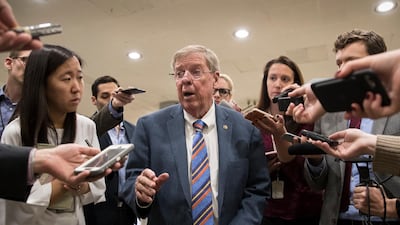The Arab Air Carriers Organisation (AACO) welcomed the removal of a controversial US proposal to levy corporation tax on Arabian Gulf airlines from Donald Trump’s sweeping tax reform bill, which was approved by the US Senate on Saturday morning.
“Reason prevailed,” said Abdul Wahab Teffaha, AACO’s secretary-general Abdul Teffaha told The National on Saturday, after the provision, tabled last month by US Senator Johnny Isakson of Georgia, was pulled from the bill.
The amendment, added last month by US Senator Johnny Isakson of Georgia, called for airlines headquartered in foreign countries to pay corporation tax if the carrier’s home country has fewer than two arrivals and departures per week operated by major US airlines, and/or the carrier’s country does not already have an income tax pre-agreement with the US.
The Wall Street Journal reported the provision was one of three removed from the bill under the US Senate’s Byrd Rule, which dictates that all legislation going through budget reconciliation must have an impact on the budget.
The proposal introduced by Senator Isakson, whose Georgia constituency is home to Delta Air Lines, was strongly criticised by the AACO – whose 30-strong membership includes Emirates, Etihad Airways and Gulf Air – who warned the move could spark retaliatory measures from other countries, leading to rising costs for airlines and consumers.
The International Air Transport Association also criticised the move.
"Reciprocity between governments on taxation is a vitally important part of this cooperation," the industry body said last month. "If enacted, the Isakson provision would upend decades of precedent - which the US has long supported - on the taxation of international aviation. It would directly impact multiple airlines from multiple countries."
_____
Read More:
Middle Eastern carriers post 4.6 per cent freight volume increase in October
Arab carriers hit out at US proposals to tax foreign airlines
_____
The decision to drop the proposal was unsurprising, given the crucial role Arabian Gulf carriers play for the US aircraft manufacturing industry, said Saj Ahmad, chief analyst at Strategic Aero Research.
“The reality is that GCC airlines are regularly placing orders worth billions of dollars in Boeing airplanes and engines from GE which support well over 270,000 aerospace jobs within the United States alone, not to mention the countless others in the extended supply chain,” he said.
“The US President is aware of job creation initiatives as part of his election pledge remain a priority.”
The move was seen as the latest salvo in a bitter dispute between three largest US airlines – United, Delta and American Airlines – and their Arabian Gulf counterparts, Emirates, Etihad Airways and Qatar Airways.
Mr Isakson’s office and Delta did not respond to requests for comment.
For years, the US carriers have lobbied federal government to curb Gulf carriers’ expansion in the states, which they claim represents “unfair competition” and breaches Open Skies agreements. The Gulf airlines say that the claims are untrue and that their American rivals cannot compete with their superior service.
But the Isakson proposal was criticised by US Airlines for Open Skies, a US body consisting of Atlas Air Worldwide, FedEx, Hawaiian Airlines, and JetBlue Airways.
“This special interest ploy was designed to hurt the Gulf carriers but would actually impact airlines from as many as 14 countries and territories, such as Jordan, Ethiopia, and Malaysia,” the group said last week.
“In addition, the provision opens the door to retaliatory taxes that would harm US airlines, particularly US cargo carriers.”
The US Senate Tax Cuts and Jobs Act was approved Saturday morning UAE time, bringing what would be the first major legislative achievement of Donald Trump’s presidency a step closer.
The act is designed to usher in the largest tax overhaul of the US tax system in decades, permanently lowering the corporate tax rate to 20 per cent from its current level of 35 per cent.
Senate Democrats, who unanimously voted against the act, warn that it primarily benefits the wealthy and large businesses, while the non-partisan Senate Joint Committee on Taxation warned it will significantly deepen the US budget deficit.

